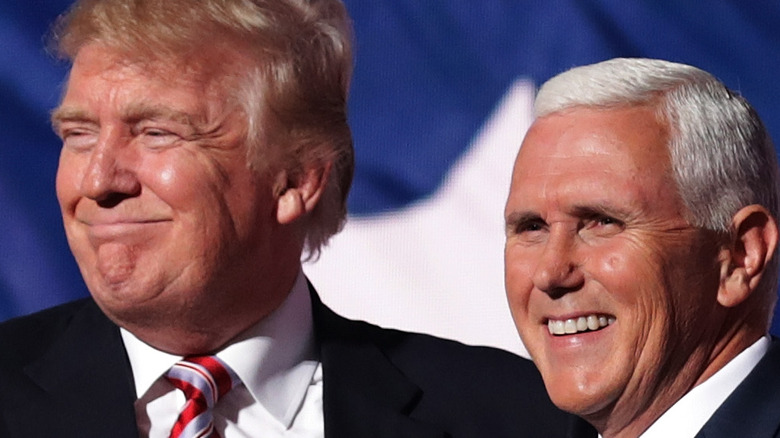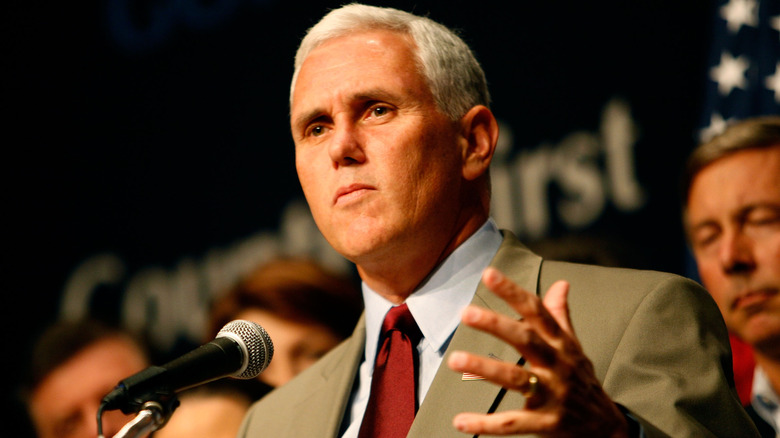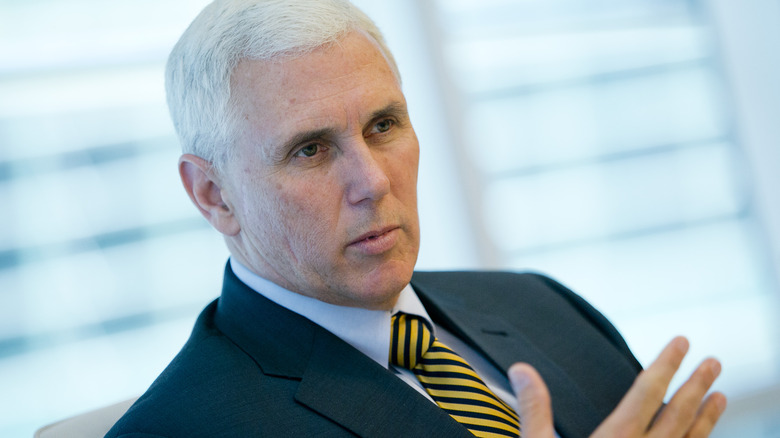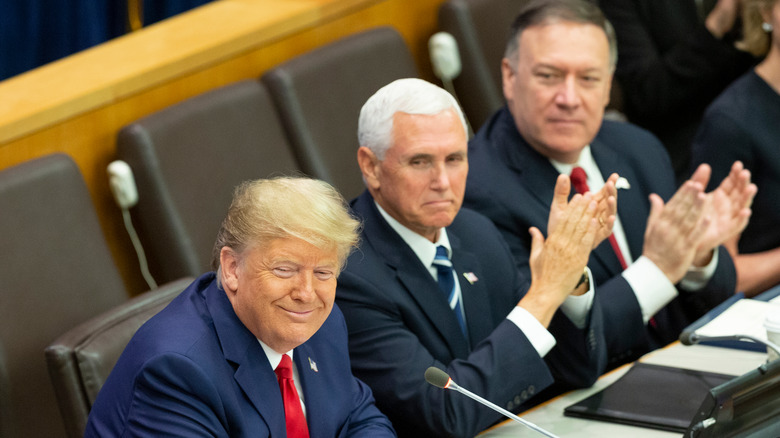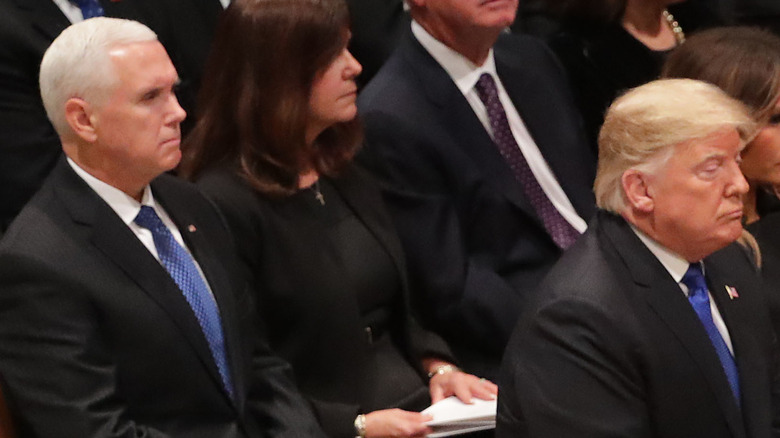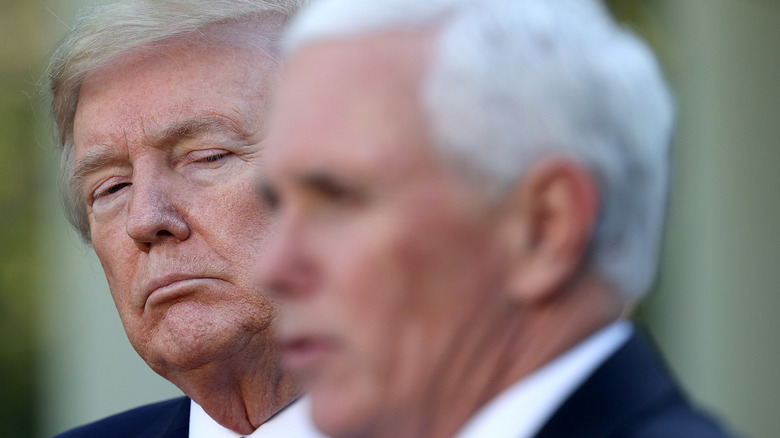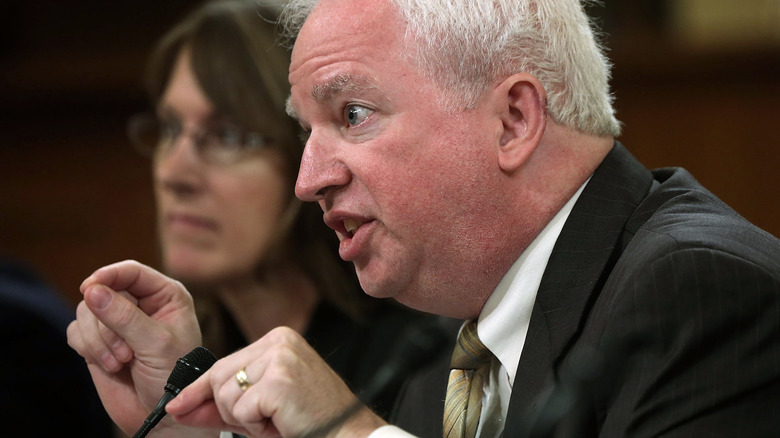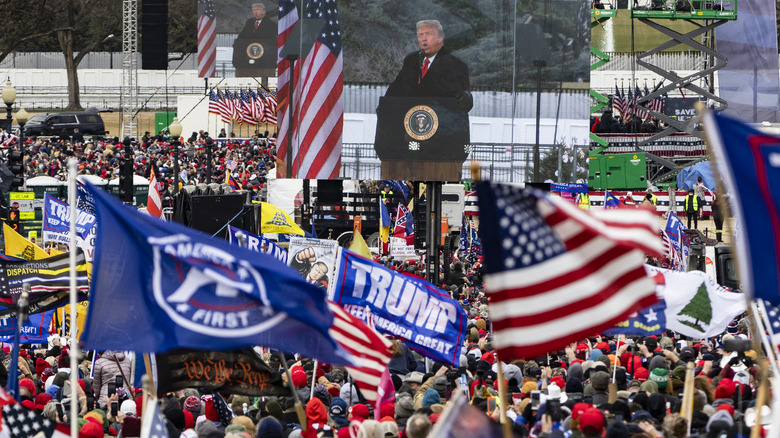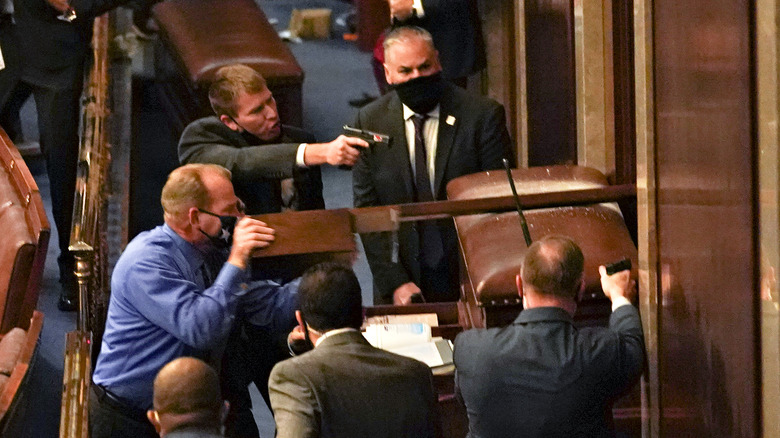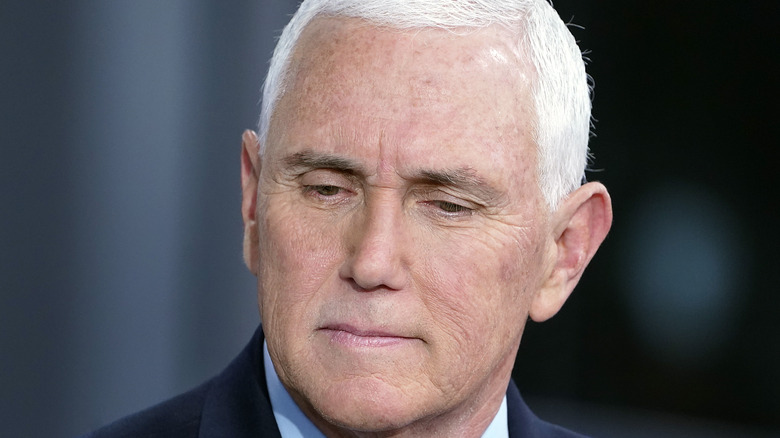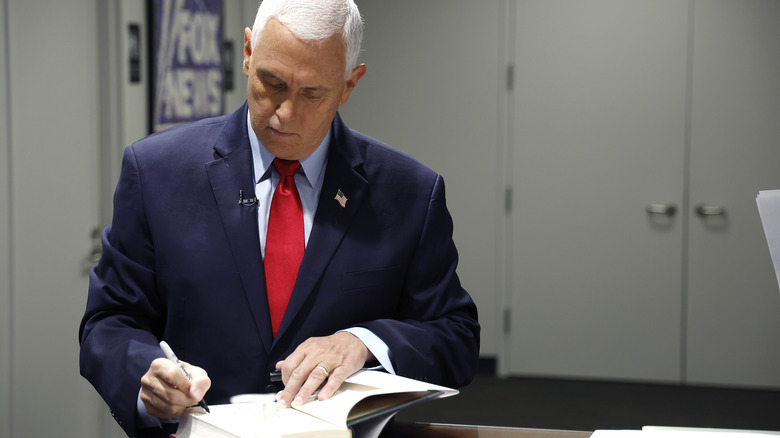The Donald Trump And Mike Pence Feud Explained
Even after the January 6 insurrection and subsequent disparaging of his character — even after four years of having to carry water for an increasingly unpopular and unstable administration and a man with a radically different character from himself — former Vice President Mike Pence spends much of his new book, "So Help Me God," defending the legacy of the Trump presidency. "I had always been loyal to President Donald Trump," he writes (via AP). According to The Guardian, Pence even insinuated in the book that anti-Trump Republican organizations like the Lincoln Project deserve some of the blame for January 6 for goading the president with ads highlighting Pence's role in certifying the 2020 election results.
Nevertheless, there is a marked change in Pence's public stance on Trump from the days when he cozied up to him on the golf course ahead of being chosen as a running mate in 2016 (per CNN). In the pages of "So Help Me God" and in interviews promoting the book, Pence has finally given voice to anger and resentment over Trump's rhetoric during and after January 6. It's widely expected that Pence will launch a bid for the Republican presidential nomination in 2024, notes the AP, which would put him into direct competition with his former boss and almost certainly revive discussion of the issues in their professional relationship inside the White House.
Donald Trump picked Mike Pence to be VP after a sufficient display of deference
Mike Pence didn't begin the 2016 election as a Donald Trump supporter. According to CNN, he initially endorsed Ted Cruz in the Republican primary. When Trump floated the idea of banning all Muslims from entering the United States during the primary, Pence dismissed it as an unconstitutional scheme. But Vanity Fair reported in 2019 that, after Trump clinched the nomination, Karl Rove and Kellyanne Conway both lobbied him to choose Pence as a running mate.
Their logic behind the choice was that Pence, as the governor of a Midwestern state, could potentially weaken the so-called blue wall between Pennsylvania and Iowa. He was perceived as stable compared to Trump's wild energy. Pence was also a devout evangelical Christian and could appeal to the religious right. Rove argued for Pence directly, while Conway argued for his qualities without putting a name to them.
Pence himself was initially skeptical that he and Trump would be compatible on a ticket. Their personalities and their policy preferences were diametrically opposed. But Pence had ambitions for higher office than governor, and those ambitions won out over any qualms about Trump himself. He tested the waters by having their families associate. The two men were later seen indulging in Trump's favorite pastime of golfing, where Pence made a point to compliment Trump's skills. Within two weeks, he was Trump's running mate.
Mike Pence may have needed a job
Mike Pence's public persona of a humble and devout man dedicated to public service through politics is, according to Vanity Fair, something of a smokescreen. Pence is well aware of how the political game is played, and he saw in Donald Trump's offer to be a running mate a launching post for his own presidential ambitions some day. Vanity Fair even quotes Pence's discussion with friend and lobbyist David McIntosh, who suggested that the Republicans would likely lose in 2016, priming Pence to be the nominee in 2020. He also assured Pence that an association with Trump wouldn't tarnish his image.
But besides any ambitions for higher office, Pence might have needed the 2016 campaign to save him from electoral disaster closer to home. As governor of Indiana, he had become extremely unpopular on the national stage for his signing of the Religious Freedom Restoration Act, widely perceived as an anti-LGBT measure. His unwillingness to take a position on gay rights in interviews brought him mockery. Within Indiana, according to the New Yorker, Pence alienated his fellow Republicans by chasing contentious national and cultural issues over state-level fiscal conservatism.
Polls indicated a tight race for Indiana governor in 2016, and private surveys indicated that Pence's support among Hoosiers had collapsed. South Bend mayor Pete Buttigieg told the New Yorker that joining Trump's campaign was the only lifeline open after Pence's grasps at national attention in his own right backfired.
'His public role is really fawning'
As vice president, Mike Pence was ever a loyal mouthpiece and defender of Donald Trump's administration. He reversed course on his criticisms of Trump before they were even elected (per CNN). His dogged shows of deference to his boss despite the vast disparity between their personal and political styles invited criticism and mockery. Jane Mayer quoted historian Joel K. Goldstein's description of Pence as "Sycophant-in-Chief" for a piece in the New Yorker.
Mayer echoed such assessments in her own interview with NPR. "He's usually acting as an emcee to Trump or kind of echoing Trump and praising Trump," she said. "So his public role is really fawning." But Mayer also said that former House speaker Newt Gingrich considered Pence one of the three centers of power in the White House, along with then-Chief of Staff John Kelly and Trump himself.
What power Pence held, Mayer argued, stemmed from three connections. As a longtime politician who had served in Congress, Pence had relationships with legislators and other figures in the Republican party. They often went to him with grievances they had with Trump, or to get work done that the president couldn't or wouldn't. Pence's ties to the religious right lent the administration clout with a key part of the Republican base. Most significant of all, in Meyer's estimation, was Pence's deep ties to the billionaire donors of the Republican party that Trump frequently ostracized during his campaign.
Trump mocked Pence and his religious supporters
One of the most striking differences between Donald Trump and Mike Pence came from their attitudes toward faith and marriage. Trump has gone through several marriages and divorces, was infamously caught bragging about boorish sexual behavior on an old "Access Hollywood" tape (via The Washington Post), and exhibited little public interest in religion before running for president. Barbara Res, a former executive at the Trump Organization, told The Atlantic that she thought her old boss was an atheist. This lack of faith by Trump was echoed by ex-aide Michael Cohen and niece Mary Trump, among others.
Pence, on the other hand, is a devout evangelical, having converted from his parents' Catholicism in college, according to The New Yorker. He's been a devoted husband to his wife Karen and maintains a personal rule against attending events where alcohol is served without his wife, or eating alone with other women. He's also hostile to abortion and gay marriage. Trump, who anonymous sources claim liked to put Pence in his place, often mocked Pence's zeal for such culture war issues and for his asking visitors to pray.
The religious right's support for Trump, helped in part by Pence's presence in the White House, invited charges of hypocrisy and division within the community, as USA Today reported in 2019. Many sources told The Atlantic that Trump took a cynical attitude towards alliances with religious figures, frequently mocked their beliefs, and regarded several church leaders as hustlers.
Trump's campaign for Pence to overturn the election began early
As any vice president would be expected to do, Mike Pence campaigned for Donald Trump's reelection in 2020. An ongoing concern during the election season was whether or not Trump would accept the results of an election he lost. It was a fear going back to 2016, according to ABC News, when Trump often levied unfounded accusations of fraud against primary results he didn't like and baselessly insisted that he won the popular vote as well as the Electoral College.
On Election Day 2020, Trump simultaneously claimed to have won and been a victim of fraud even as votes were still being counted. When the election was called for Joe Biden the following day, Trump doubled down on his cries of fraud and began working the legal system to have the results rejected. And, according to Pence's book "So Help Me God" (via AP), the president began campaigning for Pence's support in overturning their loss.
Pence claims that, on November 16, he told Trump that, if his legal challenges failed and he wasn't willing to publicly admit defeat, he could quietly slip away, support Republican congressional and gubernatorial races, and build a successful comeback for 2024. He reiterated the strategy at a later date and said that Trump should see 2020 as a small pause instead of a loss. Trump, writes Pence, made some acknowledgment of the idea but seemed unwilling to wait until 2024 to regain the White House.
Trump's lawyers gave him a plan for Pence they knew wouldn't work
Donald Trump's various legal challenges to the results of the 2020 election didn't work out in his favor. By year's end, it was clear that the courts weren't going to keep Joe Biden from assuming the presidency. So Trump's lawyers, according to CNN, drafted a memo that argued that the one way to overturn the election rested in Mike Pence's hands.
The memo, written up by John Eastman, laid out a scheme wherein Pence would throw out the electoral votes of seven states because of conflicting sets of electors. This would leave no candidate with 270 votes, and Pence would then refuse to ratify the election and send it to the House of Representatives. There, each state delegation would get one vote to decide the presidency, and since Republicans controlled 26 state delegations, they would elect Trump.
There were no competing slates of electors from the seven states mentioned, and as reported by The Washington Post, the vice president doesn't have the authority to refuse to ratify an election. Pence wrote in "So Help Me God" (via the Wall Street Journal) that Eastman himself didn't believe in his legal theory. But when Pence insisted to Trump that he couldn't and wouldn't overturn the results, Trump accused him of being "too honest" and said Pence would be remembered as stupid and cowardly.
Trump refused to help Pence or Congress during the January 6 insurrection
Mike Pence claims in his book "So Help Me God" (via AP) that he initially supported the idea of a rally on January 6, 2021. But Pence's refusal to accommodate Donald Trump's legally unfounded scheme to not certify the results of the 2020 election was something Trump refused to let go.
The Washington Post published a timeline of the events of that day. Trump took to social media before the rally to pressure Pence into rejecting the election results. During the rally, Trump repeatedly insisted Pence could keep Joe Biden from becoming president. He ended his speech with a call for the crowd to head for the Capitol, while Pence made it clear in a public statement that he would follow his constitutional duty to certify the election.
One protester later told the FBI that Pence's refusal to follow Trump's orders was what stirred the crowd into a mob. The U.S. Capitol building was stormed, forcing Congress and the vice president to be evacuated to safety. Rioters nearly reached Pence during evacuation before being led away by Officer Eugene Goodman. Trump continued to complain about Pence in tweets and took little action to help secure the Capitol. Pence and congressional leaders worked with military and security to bring the situation under control.
Did Trump agree with the rioters chanting hang Mike Pence?
During the January 6, 2021, insurrection at the U.S. Capitol, rioters upset over Mike Pence's refusal to reject the results of the 2020 election began chanting "hang Mike Pence" (per The Guardian). It's been questioned since by reporters and the House January 6 Committee just what Donald Trump's reaction was to such violent intentions aimed at his own vice president.
Jonathan Karl interviewed Trump himself for his book, "Betrayal: The Final Act of the Trump Show." In an excerpt shared with Axios, Trump claimed that he never worried for Pence's safety because he had been assured that Pence was well-protected. When Karl pressed Trump on the chants of "hang Mike Pence," Trump gave no condemnation of the rioters. Instead, he insisted that Pence should have overturned the election.
Darker claims about Trump's reaction on the day came out during the testimony of former White House aide Cassidy Hutchinson to the January 6 Committee, as per The Guardian. She claimed to have heard counsel Pat Cipollone and chief of staff Mark Meadows arguing over what to do about the insurrection. When Cipollone pointed out that rioters were threatening Pence's life, Meadows said that Trump felt Pence deserved their anger and that nothing going on in the Capitol was wrong.
Mike Pence didn't make an immediate break with Donald Trump
Mike Pence told ABC News while promoting his book "So Help Me God" that, after the January 6 insurrection and certification of the 2020 election results, it was five days before he and Donald Trump sat down for a post-riot conversation. Pence claimed that Trump asked after his family and showed signs of remorse without explicitly apologizing, wondering aloud if the January 6 rally had been a good idea. When he asked if Pence had been scared, the vice president said that he was angry.
Some of Pence's old friends in politics felt upholding his duty to certify the election was break enough. Former Arizona senator Jeff Flake, who became estranged from Pence due to his towing the line for Trump, according to the Irish Times, voiced relief that the vice president did that much. Others felt that executing the minimum requirements of office wasn't worth much praise. And in public, Pence made no firm break with Trump after the riot.
Aides have claimed that Pence's refusal to refudiate or distance himself from the administration was deliberate. He didn't want to be perceived as an enemy of the notoriously spiteful Trump. He resumed his regular workload for the weeks remaining in his term as vice president, held farewell parties for staff in the White House, and attended Joe Biden's inauguration.
Pence has split with Trump, but not with his legacy
Mike Pence wrote in "So Help Me God" (via AP) that he and Donald Trump parted on amicable terms, and that they spoke occasionally over 2021. Trump's decision to continue pushing incendiary rhetoric about the 2020 election led Pence to conclude it was time at last to break with his former boss, and he even wrote of their professional relationship: "It did not end well."
But if Pence has distanced himself from Trump personally, he hasn't distanced himself from the legacy of their four years in power. He never directly concedes that Joe Biden fairly won the 2020 election in "So Help Me God." In the same book (per The Guardian), he attempted to apportion some of the blame for the January 6 insurrection to never-Trump Republicans who targeted the then-president with mocking television ads. And much of "So Help Me God," in AP's Jill Colvin's estimation, defends or excuses the most controversial episodes of the administration.
Pence's lack of introspection on the Trump administration while trying to put daylight between himself and the former president has attracted critics. Tim Alberta wrote in The Atlantic that Pence was unique among Trump's inner circle for having a sense of decency and civility, and he was someone who understood right and wrong. Pence's refusal to reckon with the pattern of selfishness and disregard for the public welfare that led up to January 6 was a serious failure of character in Alberta's estimation.
